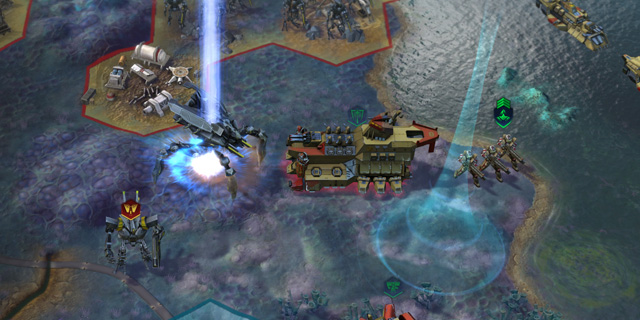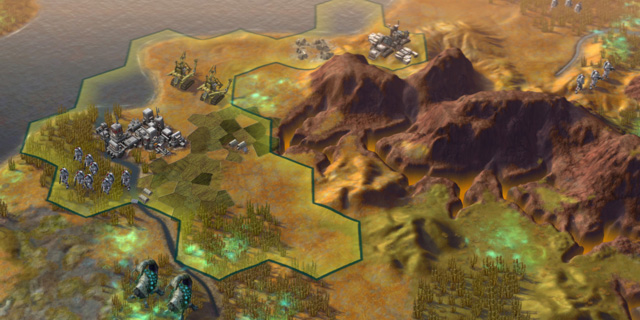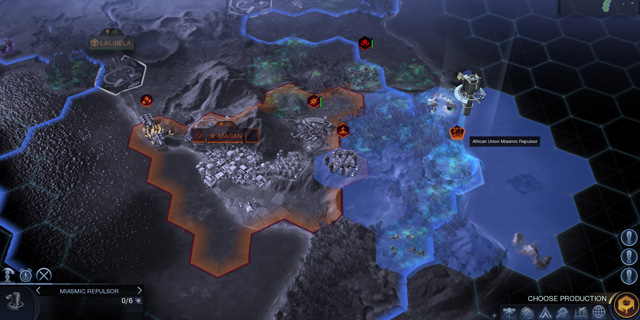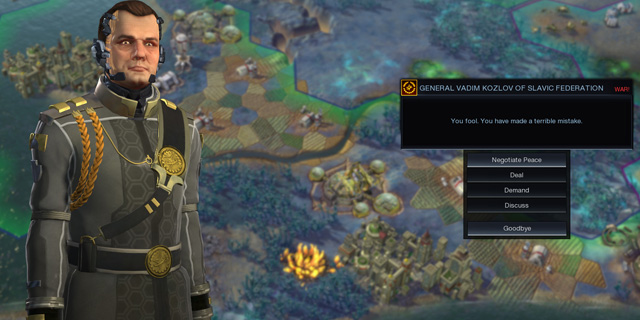
As a successor to both Civilization V and Alpha Centauri, Sid Meier’s Civilization: Beyond Earth lands a lot closer to the former. From the start, the game tries to show a natural progression from Civ V‘s science victory, though the feeling I got from the intro was a bit more grim than the ending sequence in Civ. As with Alpha Centauri, you take command of one faction as you make landfall on an alien world.
When starting a game, there are many choices to be made that aren’t present in a typical game of Civ. Interestingly, this means that the same faction plays slightly differently depending on the choices made here. Aside from picking a faction, you get to choose the type of colonists that arrive with you; this choice provides a bonus in every city you found. You also get to pick a spacecraft feature. This can provide information about the planet, such as coastlines or an initial location of alien life. Spacecraft features help out in the very early game, but don’t have a long-term benefit. Finally, you choose a cargo item, another early-game boost.
When starting a game of Civ, placing your first city is important. There is sometimes a great deal of thought put into the first move: building immediately, or moving a tile first — usually based on resources nearby or defensible terrain. In Beyond Earth, you don’t get to move any units at first, but choose your city site within a range. This is what makes all of those starting decisions important. Getting a tech lead — or starting with a military unit — can help, depending on your situation. For example, if you start near a lot of aliens, that soldier becomes invaluable.

The core catalysts at work throughout Beyond Earth are the three new victory paths. Purity represents a need to maintain an Earth-like society, and often moves towards terraforming the environment. Supremacy is about survival at all costs; this path leads toward integrating machines and alien research into your society if it proves to be beneficial, regardless of the ethical questions it raises. Harmony is the third, and leads toward coexisting with the alien life on the planet.
Research works quite a bit differently than it did in Civ. Most importantly, it forces a choice on the player. Unless you are aiming for a conquest or domination victory, you must chase after one of the three paths in your research, and if you go for every tech, you will not be able to keep up. Researching techs related to a specific path will unlock points towards that path, which in turn unlocks buildings and units for your faction. Eventually, later techs will be necessary to pursue that path’s victory condition.
One awkward aspect: some of the names for early techs don’t sound quite right. Why would a spacefaring civilization be researching “Physics,” exactly? The tech itself does lead to more advanced items, but it seems like some of the simpler techs could have had better names, though one nice thing is that the number of worker techs is far lower, and most are early in the tree. I really like this system, however. Civ has always been like a tech race; instead of focusing on a particular area, eventually you needed to get absolutely everything. Beyond Earth‘s focus on specialization seems like it’s more strategic than just producing the most science.

Conquest works as it always has, though in many ways, it’s more simplified due to the unit selection. You upgrade the same units over and over instead of having new types introduced all the time, so managing a standing army is pretty simple. The most important difference here is how dangerous the alien life can be compared to Civ‘s barbarians. For most of the game, you rely on sonic barriers to keep them away from cities, and many units such as the massive Siege Worms are generally too strong for any of your soldiers until the late game. Generally, fighting them means committing a good deal of resources toward military units you will likely lose in the process, and at the expense of science or production toward other goals. The aliens make military more useful, and continue to make exploration more challenging and less of a land grab. In gameplay terms, though, one unit per tile remains one of the best developments to this franchise.
Diplomacy works as it did in Civ V, though again, it doesn’t feel quite as useful. The three paths take the place of religion when it comes to diplomatic relations, so Purity factions are friendlier with other Purity factions and so on. This isn’t as pronounced as it was back in Civ IV, and the effect isn’t nearly that strong, thankfully. Diplomacy with AI civilizations has always been a weakness of the series, largely because seeing what goes on in games like Europa Universalis or Crusader Kings makes me wonder what a Civ game would be like with that level of complexity.
The game’s full UI and art design are great. While it is clear that it is largely a skin of Civ V‘s core engine, it feels well done, and definitely more professional than what modders could produce. The game does a very good job with presentation, but it’s still Civ V at its core. A lot of the major Alpha Centauri features are missing, including the extensive unit design system. Beyond Earth does let you customize units based on the direction you take with research, but it’s a fairly static progression forward, and tends to simply replace the constant flow of new units instead of adding strategic decisions as it did in Centauri.

There are some fairly significant technical issues in the game; whether due to instability or compatibility problems, you’ll encounter something occasionally when you play. In terms of game balance, the problems go deeper. Many aspects of the game seem to allow for some rather broken combinations, from super-powered units to nigh-impenetrable cities. There is a pronounced need for some heavy balancing, especially for competitive play, as these issues tend to make certain strategies a must have. Covert Ops feel a bit too powerful as well. Balancing is a normal part of strategy gaming, but in this case, some of these issues are more glaring than usual. Many of the broken tactics are pretty easy to do, though thankfully the AI isn’t quite that smart.
One of Beyond Earth‘s glaring problems: there is not enough to deter simply throwing cities everywhere. The cost of large empires in Civ IV and V is something that makes both of those games great. Earlier Civ games didn’t do this, making expansion so required and tedious that it ended up taking a lot of the fun out of high-level play, and this game feels very similar. Hopefully this will get addressed in a future update.
As you might expect, Beyond Earth feels a bit shallow after playing expansion-augmented Civ V, a phenomenon that repeats itself with every initial Civ release. Still, I found myself suddenly realizing it was 3 a.m. and taking just one more turn; despite numerous flaws, the Civ magic is still alive and well.
Pros: Science is more strategic, aliens keep the game interesting
Cons: Some technical problems, significant balance issues



















